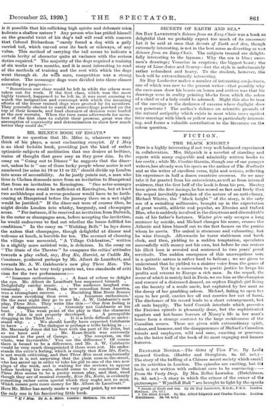FICTION.
THE BLACK KNIGHT.}
Tins is a highly interesting if not very well-balanced experiment in collaboration. Mrs. Sidgwick is a novelist of standing and repute with many enjoyable and admirably written books to her credit ; while Mr. Crosbie Garstin, though one of our younger writers, has already won his spurs as the author of The Mudlarks and as the writer of excellent verse, light and serious, reflecting his experience in half a dozen countries overseas. So wo may take it for granted from his antecedents, as well as from internal evidence, that the first half of the book is from his pen. Flaying been given the first innings, he has scored so fast and freely that the sequel inevitably partakes of the nature of an anti-climax. Michael Winter, the " black knight " of the story, is the only son of a swindling millionaire, brought up in the expectation of great wealth, athletic and popular, an Etonian and Oxford Blue, who is suddenly involved in the disastrous and discreditable ruin of his father's fortunes. Winter pire only escapes a long sentence by suicide, and Michael changes his name, crosses the Atlantic and hires himself out to the first farmer on the prairie whom he meets. The ordeal is strenuous and exhausting, but he wins through. Afterwards ho turns stableman and bank clerk, and then, yielding to a sudden temptation, speculates successfully with money not his own, but before ho can restore his illicit loan is arrested and sentenced to two years' penal servitude. The sudden emergence of this unscrupulous vein in a quixotic nature is rather hard to fathom ; we are given to understand that ho yielded to a sinister voice from the grave of his father. Yet by a concession to poetic justice he keeps his profits and returns to Europe a rich man. In the sequel, the scene of which is mainly laid in Paris, we see him as the champion and rescuer of a distressed damsel, an orphan English girl living on the bounty of a senile uncle, but exploited by her aunt as the decoy of her gambling saloon. Michael, failing to open her eyes to her peril, carries her off and marries her out of hand. The disclosure of his record leads to a short estrangement, but all ends happily. The brief Cornish interlude which precedes the Parisian episode is pleasantly done, but the sophisticated squalors and hot-house horrors of Nancy's life in her aunt's house form a strange contrast to the large recklessness of the Canadian scenes. These are given with extraordinary spirit, colour, and humour, and the disappearance of Michael's Canadian friends and employers, wild and sane, exacting or generous, robs the latter half of the book of its most engaging and human features.


































 Previous page
Previous page